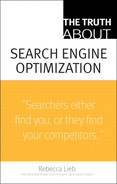If inbound links are one of the fastest ways to inclusion in search engine indices, online directory listings are one of the fastest means to that end.
Of course, just as all links aren’t created equal, neither are all online directories—of which there are thousands. You could, of course, submit your site to every directory out there. But going under the assumption that your time and resources are in shorter supply than the sheer number of directories on the Internet, it would be wise to take a more considered approach.
A logical place to start is by submitting to the Open Directory Project (www.dmoz.org), which calls itself “the largest, most comprehensive human-edited directory of the Web”. Its data powers the core directory services for many of the Web’s major search engines, including Google, AOL Search, Netscape Search, and Alexa.
The Open Directory Project is the only major online directory that’s free, which is both good news and bad. Often called DMOZ or referred to as ODP, it’s constructed and maintained by a vast community of volunteer human editors. (We can put those scurrying spiders to rest in this section!) So, although no money changes hands in exchange for a listing, the lapse between submission and inclusion can range from a few days to—brace yourself—even years.
That’s why very often, the first stop on the SEO directory odyssey is Yahoo!. Its size and scope rival DMOZ, and like the Open Directory, the Yahoo! Directory is human-edited. It’s possible to submit a site for free, but many commercial sites find it worthwhile to fast-track their listing by paying a nonrefundable $299 fee. This ensures that the site will be reviewed for inclusion (provided it doesn’t feature adult content or services), but it does not guarantee that the site will actually be included in the directory. If it is included, the listing can be edited, recategorized, or removed at any time at the discretion of the editors.
So why would anyone pay Yahoo! $299 for what could amount to...nothing? Assuming the submitted site is legitimate, it most likely will be included. And once it’s in Yahoo!’s directory, the listing will be indexed by Google as well.
Other general directories you might consider include Starting Point, ExactSeek, and Best of the Web.
Although listings in general directories such as DMOZ and Yahoo! are valuable, high-quality and well-trafficked directories that are relevant to a website’s content can also provide valuable—and highly relevant—inbound links.
Does the website you are marketing represent a business? Business.com has listings in over 65,000 business categories. You might still think of Yellowpages.com as a telephone directory, but listings will link to a business’s website. Even free agents such as freelancers and consultants have options. Industry directories abound. Sites such as MediaBistro.com link to freelance writers, editors, photographers, and others in the media business.
Better still for relevancy would be to dig down deep into your vertical area of expertise. Conduct a search of your keywords, plus a phrase such as “recommended links” or “best of the Web” or even just plain old “links”. This will reveal which listings have the most link juice—for example, the online resources advocated by prestigious sites such as Breastcancer.org, Nature.com, MIT’s Comparative Media Studies Program, and Forbes.com.
Many websites will fit into multiple categories, of course. That means you should, therefore, consider a variety of directories. A cultural institution that houses a restaurant, for example, might be classified under “museum” or “dining,” but both features of the establishment have specific local appeal. They should also be listed in travel directories, as well as local city guides and event listings.
With scads of directories on the Web, exercising at least some judgment is in order, as well as applying common sense criteria, as follows:
• Is the directory run by a known entity?
• Is it a useful resource?
• Has it been around for a while (perhaps even in an offline incarnation, in the pre-Internet era, such as a local Chamber of Commerce guide or even the trusty Yellow Pages)?
• Does it contain a significant number of listings, including the “usual suspects” in the vertical area it covers? I’d certainly shy away from a New York City shopping directory that left out Bloomingdale’s or Macy’s.
• Does it look spammy, or contain unrelated links and content?
• Is there a clear editorial policy outlining how to be included, and what you’re paying for in terms of a review? Is it designed for actual humans to use, or does it appear to be a link farm (defined in Truth 46, “Don’t cultivate link farms”) designed to appeal to search engines? Does the directory itself rank well in search engine listings?
• Do the links work? Lots of broken links mean an out-of-date and not maintained directory.
Although this might sound like a long list of questions, first impressions count. If it looks and smells fishy, it probably is. Don’t waste time with directories designed to separate link-hungry site owners from their money.
